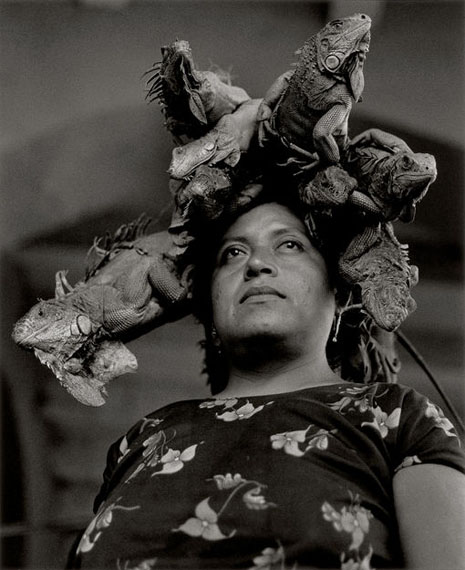
Our Lady of the Iguanas. Juchitán, Mexico, 1979
© Graciela Iturbide / Colecciones Fundación MAPFRE, 2019
Graciela Iturbide »
GRACIELA ITURBIDE
Exhibition: 8 Mar – 30 Jun 2019
Thu 7 Mar 19:00

FFF Fotografie Forum Frankfurt
Braubachstr. 30-32
60311 Frankfurt (Main)
+49 (0)69-291726
contact@fffrankfurt.org
www.fffrankfurt.org
Tue-Sun 11-18
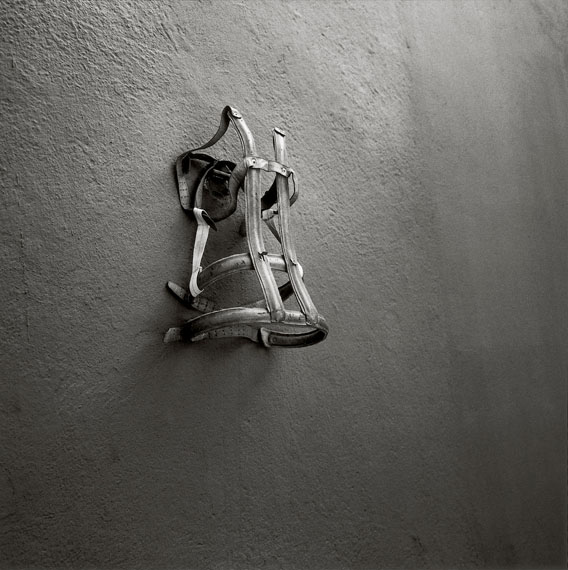
Frida’s Bathroom, Mexico City, 2006
© Graciela Iturbide / Colecciones Fundación MAPFRE, 2019
Graciela Iturbide
Exhibition: 8 March – 30 June, 2019
Opening: Thursday, 7 March, 7 pm
With her black and white images Graciela Iturbide brings us the shadows of human existence. Traditions and their fragility, belief and religion, community and death are common themes for the artist. Within a five-decade career she has built an œuvre that is fundamental for understanding the development of photography in Mexico and the rest of Latin America. The Fotografie Forum Frankfurt (FFF) honours the artist, who was born in 1942 in Mexico-City, with her first retrospective in Germany. The exhibition "GRACIELA ITURBIDE" has been organised by Fundación MAPFRE, Madrid, in cooperation with the FFF. It highlights seminal works from all creative phases of this exceptional photographer and is solely comprised of photographs belonging to the Fundación MAPFRE Collection since 2008.
Many of Graciela Iturbide’s works are inspired by social norms and values, and evolve around cultural tensions, especially in her home country. This appears already in her first major photographic project "Juchitán de las Mujeres" (Juchitán of Women). Between 1979 and 1988 Iturbide repeatedly traveled to the myth-shrouded Zapotec heartland of Juchitán in the southern state of Oaxaca, which is well known for the dominance of women in the local economy and politics today. She lived within the matriarchal community and photographed the women over an extended time period, unforgettably portraying their deeply rooted independence and their dignified strength.
Another project in which Graciela Iturbide straddles the boundary between the documentary and the lyrical, focuses on the Seri Indians of the Sonoran Desert. Beginning in the end of the 1970s, she goes beyond the specifics of the everyday to capture the dichotomy of the indigenous life shaped by ancestral traditions and western modern spirit.
Again and again Iturbide reveals her talent for stirring up unusual visual metaphors to tell about the diversity of life itself. She demonstrates this by mirroring the theatricality of religious celebrations and the popular Mexican carnival rituals associated with death, or through the body language of the "White Fence" gang members from the 1980s in Los Angeles. The mystical atmosphere of botanical gardens and landscapes which she pictured in Mexico as well as on travels to such contrasting countries as India, Italy and Madagaskar are also similar visual allegories, not to forget her fascinating images of birds that she has spent so many years photographing.
In 2006 Graciela Iturbide became the first person to be allowed to enter the bathroom of Frida Kahlo which had been closed since the painter’s death in 1954. Respectfully the icon of Mexican photography approaches this icon of Mexican painting – by opening a dialogue with the painter’s objects and utensils that Iturbide found left in the room. A dynamic completely corresponding to her own artistic need: "Photography is a pretext to discover", as Iturbide herself puts it.
Graciela Iturbide grew up in a traditional Catholic family. She first studied film at the Universidad Nacional Autónoma de México (Independent National University of Mexico) and then, inspired by her mentor Manuel Álvarez Bravo discovered photography as her true vehicle for creative expression. It also helped her to cope with a personal tragedy, the death of her six-year-old daughter. Iturbide’s photographs have been exhibited all over the world and she has received multiple recognitions for her work, amongst others with the W. Eugene Smith Fund Grant (1987), the International Grand Prize of the Museum of Photography in Hokkaido, Japan (1990) and the prestigious Hasselblad Award (2008). Graciela Iturbide lives and works in Coyoacán, the artists’ quarter of Mexico City.
�
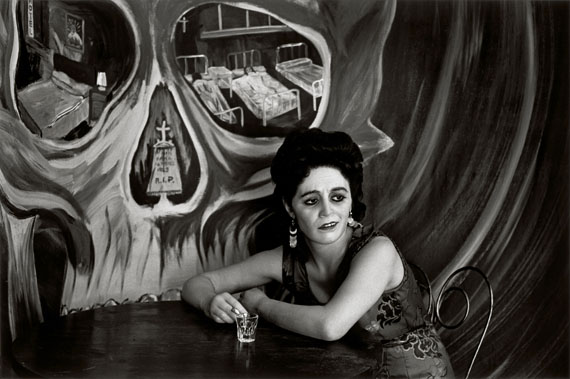
© Graciela Iturbide / Colecciones Fundación MAPFRE, 2019
Graciela Iturbide
Ausstellung: 8. März bis 30. Juni 2019
Eröffnung: Donnerstag, 7. März, 19 Uhr
Ihre Bilder sind immer schwarzweiß – und zeigen zugleich alle Schattierungen der menschlichen Existenz. Traditionen und ihre Brüchigkeit, Glaube und Religion, Gemeinschaft und Tod gehören zu den zentralen Themen von Graciela Iturbide. Ihr über fünf Jahrzehnte entstandenes Œuvre gilt als grundlegend für das Verständnis der mexikanischen und der gesamten lateinamerikanischen Fotografie. Das Fotografie Forum Frankfurt (FFF) ehrt die 1942 in Mexiko-City geborene Künstlerin mit der ersten Retrospektive in Deutschland. Die Ausstellung "GRACIELA ITURBIDE" wurde von der Fundación MAPFRE, Madrid, organisiert und präsentiert in Kooperation mit dem FFF Werke aus allen Schaffensphasen dieser außergewöhnlichen Fotografin. Die ausgestellten Werke gehören seit 2008 zur Sammlung der Fundación MAPFRE.
Viele der Arbeiten von Graciela Iturbide kreisen um Normen und Werte, thematisieren kulturelle Spannungen, vor allem in ihrem Heimatland. Das zeigt sich bereits in ihrem ersten Hauptwerk, der Langzeitstudie "Juchitán de las Mujeres" (Juchitán of Women). Zwischen 1979 und 1988 reist Iturbide immer wieder in die mythische Stadt Juchitán im südmexikanischen Staat Oaxaca, Heimat der antiken Hochkultur der Zapoteken und heute bekannt für die Dominanz der Frauen in der örtlichen Wirtschaft und Politik. Sie lebt zeitweise in der matriarchalen Gemeinschaft, porträtiert die Frauen, ihre tief verwurzelte Unabhängigkeit und ihre würdevolle Stärke.
Ein anderes Projekt, das Graciela Iturbide zwischen dem Dokumentarischen und dem Poetischen positioniert, befasst sich ab Ende der 1970er Jahre mit den Seri-Indianern in der Sonora-Wüste. Dabei gelingt es ihr, über die konkreten Lebensumstände hinaus den Zwiespalt einzufangen, der das indigene Leben zwischen ethnischer Tradition und westlicher Moderne prägt.
Immer aufs Neue zeigt sich Iturbides Talent, mit ungewöhnlichen visuellen Metaphern von der Vielschichtigkeit des Lebens zu erzählen. Dazu gehört die Theatralik religiöser Feiern und karnevalartiger Totenrituale in den Straßen Mexikos, der Körperkult der 1980er-Straßengang "White Fence" in Los Angeles und die mystische Atmosphäre in Gärten und Landschaften, die sie in Mexiko und auch auf ihren Reisen in so gegensätzliche Länder wie Indien, Italien und Madagaskar entdeckt. Und dazu gehören über alle Jahre hinweg ihre faszinierenden Fotoessays über Vögel.
2006 durfte Graciela Iturbide als Erste eines der Badezimmer im Haus von Frida Kahlo fotografieren, das seit deren Tod 1954 geschlossen war. Voller Respekt nähert sich die Ikone der mexikanischen Fotografie der Ikone der mexikanischen Malerei – im Dialog mit den Objekten und Utensilien der Malerin, die Iturbide in dem Raum vorfindet. Ganz gemäß ihrem künstlerischen Anspruch, "photography is a pretext to discover". Mit anderen Worten: Fotografieren um zu erkennen.
Graciela Iturbide, Tochter einer traditionellen katholischen Familie, studierte zunächst Film an der Nationalen Universität Mexico City, ehe sie inspiriert von ihrem Lehrer Manuel Álvaro Bravo die Fotokamera für sich entdeckte. Zugleich war die Fotografie für sie ein Weg, den Tod ihrer sechsjährigen Tochter zu verarbeiten. Iturbides Arbeiten wurden in aller Welt gezeigt und vielfach ausgezeichnet, u.a. mit dem W. Eugene Smith Fund Grant (1987), dem International Grand Prize of the Museum of Photography in Hokkaido, Japan (1990) und dem renommierten Hasselblad-Award (2008). Graciela Iturbide lebt und arbeitet im Künstlerviertel Coyoacán in Mexico-City.
�
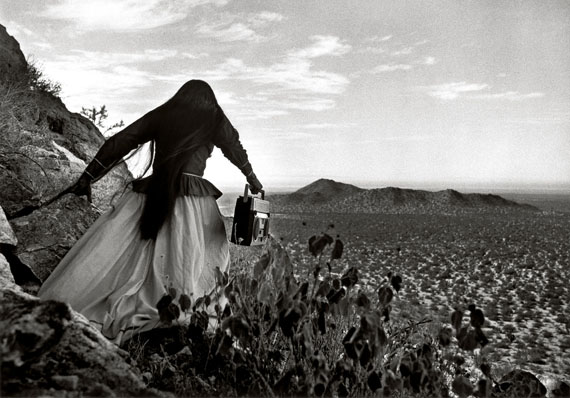
Angel Woman, Sonoran Desert, Mexico, 1979
© Graciela Iturbide / Colecciones Fundación MAPFRE, 2019
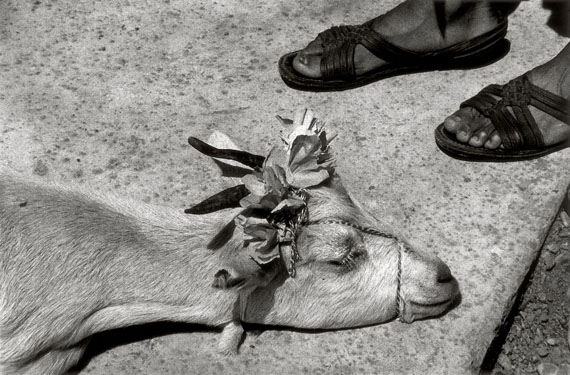
The Goat’ Dance, La Mixteca, Oaxaca, Mexico, 1992
© Graciela Iturbide / Colecciones Fundación MAPFRE, 2019